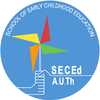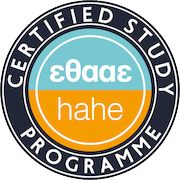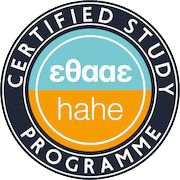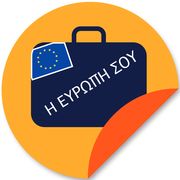|
2014-2017: Ph.D., Department of Educational Science and Early Childhood Education (Dpt of ESECE), University of Patras, Greece 2011-2013: Master Degree in “Natural Sciences Didactics: The Curriculum, Evaluation and ICT in Education”, Dpt of ESECE, University of Patras, Greece 2000-2004: Diploma of Educational Science and Early Childhood Education, Dpt of ESECE, University of Patras, Greece |
-
![Φραγκιαδάκη Γλυκερία [Fragkiadaki Glykeria]'s picture](https://www.nured.auth.gr/dp7nured/sites/default/files/styles/profile_image/public/pictures/picture-1293-1645528029.jpg?itok=6rJQKdpa) Faculty Member
Faculty MemberΦραγκιαδάκη Γλυκερία [Fragkiadaki Glykeria]
Status: Assistant ProfessorArea of Specialization: Early Childhood Science EducationFull cv: CV_full_english (10.23).pdf e-mail: fragkiadaki@nured.auth.gr
CV_full_english (10.23).pdf e-mail: fragkiadaki@nured.auth.gr
Current research
- STEM concept formation in the early years
- science learning and development in dialectical interrelation with the child’s social and cultural reality
- science teaching and learning as part of the everyday educational reality in preschool settings
- play, imagination, and creativity as means for teaching and learning science/STEM in preschool settings
- children’s drawings as a means for teaching and learning science in preschool settings
- scientific literacy in the early years
- Cultural-historical theory and methodology
Research - Scientific Fields
Scientific fields:
Research Fields:
Keywords:
Studies
Recent publications
Α. Research papers
- Fragkiadaki, G, Fleer, M., & Rai, P. (in press). Science concept formation during infancy, toddlerhood, and early childhood: Developing a scientific motive over time. Research in Science Education.
- Fleer, M., Fragkiadaki, G., & Rai, P. (2022) The dialectical relation of real and digital Conceptual PlayWorlds in Family Day Care, International Journal of Early Years Education. https://doi.org/10.1080/09669760.2022.2041406
- Fleer, M., Fragkiadaki, G., & Rai, P. (2022). The place of theoretical thinking in professional development: Bringing science concepts into play practice. Learning, Culture and Social Interaction, 32, 100591. https://doi.org/10.1016/j.lcsi.2021.100591
- Fragkiadaki, G., Fleer, M., & Rai, P. (2021). The social and cultural genesis of collective imagination during infancy. Learning, Culture and Social Interaction, 29, 100518. https://doi.org/10.1016/j.lcsi.2021.100518
- Fragkiadaki, G. & Ravanis K. (2021). The unity between intellect, affect, and action in a child's learning and development in science. Learning Culture and Social Interaction, 29. https://doi.org/10.1016/j.lcsi.2021.100495
- Fragkiadaki, G., Fleer, M., & Rai, P. (2021). Collective imagining: The early genesis and development of a sense of collectiveness during infancy. Cultural-Historical Psychology, 17(3), 84-93.https://doi.org/10.17759/chp.2021170312
- Fleer, M., Fragkiadaki, G., & Rai, P. (2021). Collective imagination as a source of professional practice change: A cultural-historical study of early childhood teacher professional development in the motivated conditions of a Conceptual PlayWorld. Teaching and Teacher Education, 106, 103455. https://doi.org/10.1016/j.tate.2021.103455
- Stephenson, T., Fleer, F., & Fragkiadaki, G. (2021). Increasing girls’ STEM engagement in early childhood: Conditions created by the Conceptual PlayWorld model. Research in Science Education, 1-18. https://doi.org/10.1007/s11165-021- 10003-z 4
- Stephenson, T., Fleer, M., Fragkiadaki, G., & Rai, P. (2021). Teaching STEM through play: conditions created by the conceptual playWorld model for early childhood teachers. Early Years, 1-17. https://doi.org/10.1080/09575146.2021.2019198
- Stephenson, T., Fleer, M., Fragkiadaki, G., & Rai, P. (2021). “You Can Be Whatever You Want to Βe!”: Transforming Teacher Practices to Support Girls’ STEM Engagement. Early Childhood Education Journal, 1-12. https://doi.org/10.1007/s10643-021-01262-6
- O’Connor, G., Fragkiadaki, G., Fleer, M., & Rai, P. (2021). Early childhood science education from 0 to 6: a literature review. Education Sciences, 11(4), 178. https://doi.org/10.3390/educsci1104017
- Fragkiadaki, G, Fleer, M., & Ravanis, K. (2021). Understanding the Complexity of Young Children’ s Learning and Development in Science: A Twofold Methodological Model Building on Constructivism and Cultural- historical Strengths. Learning Culture and Social Interaction, 28, 10046. https://doi.org/10.1016/j.lcsi.2020.100461
- Fragkiadaki, G., Armeni, A., Zioga, S., & Ravanis, K. (2021). Dramatic play as a means to explore and support preschool children’s thinking about thermal insulation. Journal of Childhood, Education & Society, 2(3), 220-234. https://doi.org/10.37291/2717638X.20212395
- Zotti, E. & Fragkiadaki, G. (2021). Greek Pre-service and In-service Early Childhood Teachers’ Beliefs about Approaching and Teaching Science in the Early Years. Mediterranean Journal of Education, 1(1), 31-42.https://doi.org/10.26220/mje.3402
- Fleer, M., Fragkiadaki, G., & Rai, P. (2020). STEM begins in infancy: Conceptual PlayWorlds to support new practices for professionals and families. International Journal of Birth and Parent Education,7(4).
- Fleer, M., Fragkiadaki, G., & Rai, P. (2020). Methodological Challenges of Studying Children in a Living Laboratory: Case example of Conceptual PlayLab. Cultural-Historical Psychology, 16(3), 47-59. https://doi.org/10.17759/chp.2020160306
- Fragkiadaki, G. (2020). Conflicts during Science Concept Formation in Early Childhood Barriers of Turning Points?. Review of Science, Mathematics and ICT Education, 14(1), 113-128. https://doi.org/10.26220/rev.3367
- Fragkiadaki, G. (2020). Young Children’s Representations and Ideas about the Mathematical Signs of Plus and Minus. European Journal of Alternative Education Studies, 5(1), 108-119. https://doi.org/10.5281/zenodo.1973262
- Rai, R., Fleer, Μ., & Fragkiadaki, G. (2020). Theorising Digital Tools: Mutual Constitution of the Person and Digital in a Conceptual PlayWorld. Human Arenas. https://doi.org/10.1007/s42087-020-00178-8
- Fleer, Μ., Fragkiadaki, G., & Rai, R. (2020). Programmatic research in the Conceptual PlayLab: STEM PlayWorld as an educational experiment and as a source of development. Science Education: Research & Praxis, 76, 9-23.
- Fragkiadaki, G., Fleer, M., & Ravanis, K. (2019). A cultural-historical study of the development of children’s scientific thinking about clouds in everyday life. Research in Science Education, 49(6), 1523-1545. https://doi.org/10.1007/s11165-017-9665-8
- Delserieys, A., Impedovo, M. A., Fragkiadaki, G., & Kampeza, M. (2017). Using drawings to explore preschool children’s ideas about shadow formation. Review of Science, Mathematics and ICT Education, 11(1), 55-69. https://doi.org/10.26220/rev.2778
- Remountaki, E. L., Fragkiadaki, G., & Ravanis, K. (2017). Conceptualizing solid in liquid dissolution in early childhood education settings: a socio-cultural approach. European Journal of Education Studies, 3(6), 301- 318.https://doi.org/10.5281/zenodo.582225
- Fragkiadaki, G. & Ravanis, K. (2016). 'Экспериментально-генетический метод в контексте обучения естественным наукам в дошкольном возрасте: исследование развития научного мышления с позиции культурно-исторического подхода (Genetic research methodology meets Early Childhood Science Education research: a Cultural-historical study of child’s scientific thinking development)'. Cultural-Historical Psychology 12(3), 310-330. doi: 10.17759/chp.2016120319
- Kampeza, M., Vellopoulou, A., Fragkiadaki, G., & Ravanis, K. (2016). The expansion thermometer in preschoolers’ thinking. Journal of Baltic Science Education, 15(2), 185-193.
- Georgantopoulou, A., Fragkiadaki, G., & Ravanis, K. (2016). Clouds as natural entities in preschool children’s thought. Educational Journal of the University of Patras UNESCO Chair, 3(2), 114-128. https://doi.org/10.26220/une.2737
- Fragkiadaki, G. & Ravanis, K. (2015). Preschool children’s mental representations of clouds. Journal of Baltic Science Education, 14,(2), 267-274.
- Fragkiadaki, G. & Ravanis, K. (2014). Mapping the interactions between young children while approaching the natural phenomenon of clouds creation. Educational Journal of the University of Patras UNESCO Chair, 1(2), 112-122. https://doi.org/10.26220/une.2194
Β. Book chapters & proceedings
- Rai, R., Fleer, Μ., & Fragkiadaki, G. (in press). Unpacking the Role of the Researcher in an Educational Experiment: Digital Proximity and Distal Participation. In C. McLachlan (Ed.) Data Systems in Early Childhood Settings. Springer.
- Remountaki, E. L., Fragkiadaki, G., & Ravanis, K. (in press). How does science learning happen during scientific play? The case example of the concept formation of dissolution. In Katerina Plakitsi and Sylvie Barma (Eds.) Sociocultural approaches in STEM Education. Springer Series Cultural Studies of Science Education. Springer.
- Fragkiadaki, G., Fleer, M., & Rai, P. (2021). Degrees of freedom in collective play: how different institutions create diverse conditions for young children's interactions. In M. Sakellariou (Ed.), Child Interaction: Perspectives, Activities and Outcomes (1st ed., pp. 71-93). Nova Science Publishers.
- Fleer M., Fragkiadaki G., Rai P. (2021) The Cultural Formation of Science Knowledge. In: Atwater M.M. (eds) International Handbook of Research on Multicultural Science Education. Springer International Handbooks of Education. Springer, Cham. https://doi.org/10.1007/978-3-030-37743-4_60-1
- Delserieys, A., Fragkiadaki, G. & Kampeza, M. (2021). Dessiner et faire comprendre la formation des ombres. In F. Charles (Ed.), Graines de scientifiques en maternelle: Explorer le monde du vivant, des objets et la matière (pp. 97-118). Les Ulis: EDP Sciences. https://doi.org/10.1051/978-2-7598-2562-2.c007
- Fragkiadaki, G., Fleer, M., & Rai, P. (2021). Innovation in early childhood and primary education. In Educational Innovation in Society 5.0 Era: Challenges and Opportunities (pp. 7-10). CRC Press.
- Fragkiadaki, G. (2021). Transforming Conflicts, Shaping Collective Experiences, Creating Conditions for Development. E-proceedings of the ISCAR 2019 Regional Conference: Crisis in Contexts.
- Fragkiadaki, G., Fleer, Μ., & Rai, R. (2020). Play Creates Meaningful Conditions for the Interrelations between Everyday Concepts and Scientific Concepts. Proceedings of the 4th International Conference on Learning Innovation and Quality Education (ICLIQE), September 5th, Surakarta, Central Java, Indonesia.
- Delserieys-Pedregosa, A., Fragkiadaki, G., & Kampeza, M. (2018). Dessiner et comprendre des concepts en sciences Le cas de la formation des ombres en maternelle. Ε- proceedings of the 10e rencontres scientifiques de l’ARDiST.
- Ravanis, Κ. & Fragkiadaki, G. (2018). Énergie et panneaux solaires/ Lumière et ombre (Rapport Technique). Bretange, France: Erasmus+ Settore Istruzione Scolastica Attività KA2 - Partenariati strategici 2015-1-IT02-KA201-015237, Amélioration de la professionalité des enseignants Coordinatrice du manuel: Catherine Goujon, UBO - ESPE de Bretagne.
- Delserieys, A., Fragkiadaki, G., & Kampeza, M. (2017). Learning and drawing about shadows in early childhood education. Uploaded text at the webside of the 12th Conference of the European Science Education Research Association (ESERA) “Research, practice and collaboration in science education”, Dublin, Ireland.
|
C. International Conferences/ Seminars
F. Greek Conferences/ Seminars
|














